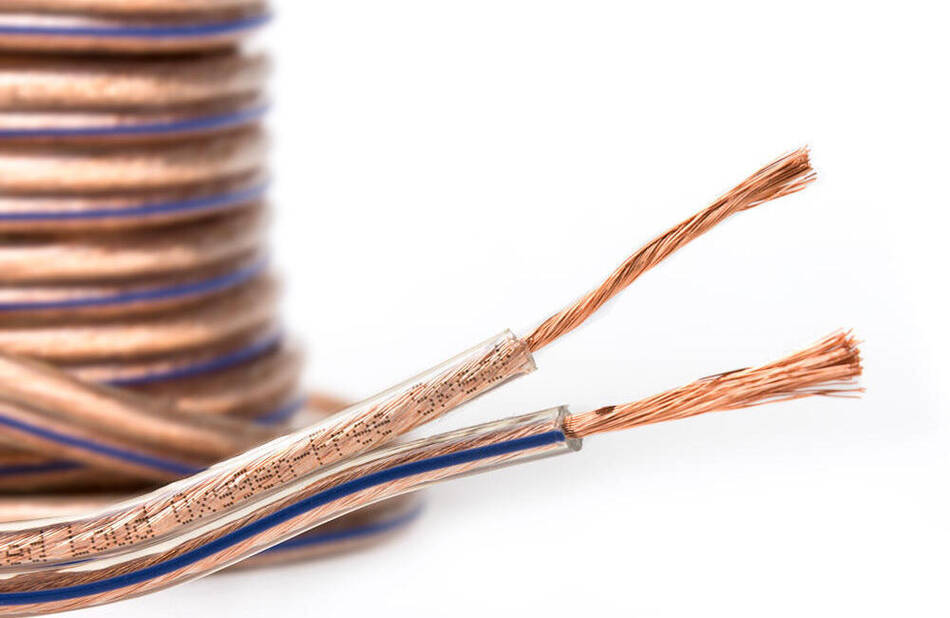
Speaker wires serve as the electrical connection between audio amplifiers and loudspeakers. They are used to transmit sound signals from audio amplifiers to speakers.
Like the normal wires that we are used to in our everyday lives, are speaker wires dangerous as well? Can speaker wires shock you? Most people cannot tell with certainty the true extent of electrical hazards posed by speaker wires.
Speaker wires cannot shock you. The amount of current that passes through speaker wires is very low and not strong enough to cause an electric shock to humans beings.
Table of Contents
Is There Voltage in Speaker Wires?
There is voltage in speaker wires. Any medium that carries or transports electricity has some amount of voltage inside it. In speaker wires, the amount of voltage that runs through them is dependent on the amplifier power.
Speaker wires carry whatever level of voltage that comes out of the amplifier they are connected to. For a 100-watt amplifier that is driving an 8 Ohm speaker, the voltage that will be transmitted through the speaker wires would be about 30 volts. This voltage is entirely dependent on the power rating of the amplifier.
This means an amplifier with a higher power rating will drive a relatively high voltage through the speaker wires connected to it.
So yes, a speaker wire connected to a powered amplifier has some voltage running through it. With speaker wires, the voltages involved are very low. This voltage is usually quite small that most people would not feel it. Thus, electric shock is rare from appliances and wires with low voltages passing through them.
Are Speaker Wires Dangerous?
Speaker wires are not plugged into a wall socket or an extension socket. They are “plugged into amplifiers instead. Due to this, they do not carry the same high level of current as normal power cords. Generally, audio signals that run through speaker wires are not strong enough to be dangerous when touched.
However, this is not enough reason to be complacent when handling speaker wires. Speaker wires are made of two stranded wires, usually made of copper. These copper wires are heavily insulated by plastic such as PVC, and as such, as long as the currents stay inside the wires, it poses no danger to people. With electricity being confined within the speaker wires at all times, there is little risk of electrocution.
With that being said, due to the low current that passes through speaker wires, even when the naked speaker wires come in contact with the human body, it will not pose any harm.
Are Speaker Wires Dangerous?: Trailing Wires
There is a belief that, whenever wires and human beings come together, there is always the potential for injury or harm to occur. This potential for injury can be from trailing wires or electrical shock. In the case of speaker wires, this danger results from trailing wires and no risk of electrical shock.
Trailing wires is one of the most prevalent causes of accidents and injuries in workplaces and homes. It is very easy to catch your foot on stray wires. This can cause you to stumble forward and possibly injure yourself on a nearby surface or object. As a result of this, there is the need to ensure that speaker wires are not left lying about loosely.
Due to the potential injury that trailing speaker wires can cause, it is not advisable to run speaker wires across walkways and doorways.
Are Speaker Wires Dangerous?: Danger to Equipment
Sometimes, speaker wires pose a danger to other musical equipment. Speaker wires can cause damage to the appliances they are connected to. This means speaker wires can cause harm to the speakers and amplifiers they are connected to. If speaker wires are not handled properly, they can cause damage to amplifiers by causing them to blow out.
Bad wiring and broken speaker wires can also cause intermittent signals and transients that can damage your speakers. Transients are sudden bursts of energy that can be caused by abruptly powering off of your speakers. This damage can occur when speakers are very hot.
What Happens If Speaker Wires Touch
A Speaker wire is basically like any other wire out there. As I mentioned earlier, it consists of two small wires — positive and negative wire. Usually, the positive wire is red, and the negative wire is black. However, most speaker wires are not colored.
Like every wire out there, current flows from positive to negative. Hence, as long as the speaker wire is connected to a powered amplifier, there will be a current flow through the speaker wire. Current always flows from the positive side to negative the negative side of a circuit.
When these two wires touch, it leads to the short-circuiting of the source supplying current to these wires. This source is usually the amplifier. Therefore, when speaker wires touch, this results in shorting out of the amplifier. This causes the side of the amplifier (channel) where the speaker wire is connected to die out.
How To Handle Speaker Wires
It is very important to take safety precautions when working with speaker wires. Due to some of the risks and dangers that surround the use of speaker wires, safety must not be compromised when handling wires in general.
Let’s take a look at some basic information to bear in mind regarding the safe handling of and management of speaker wires. Adhering to these practices will protect not only your speaker wires but your amplifiers and speakers as well.
Regular Checks and Inspection of Speaker Wires
One of the major reasons why wires, in general, pose a risk is that the danger they pose might not be immediately visible. A wire might appear to be in good working condition but actually have a small cut or fray that might not be easily seen.
Inspecting your speaker wires regularly will help you see if they are looking good and have no frays, damaged or broken parts.
Regular inspections will also help you to identify if the speaker wires are securely connected to the amplifiers and speaker connectors. It is worth noting that one of the most important measures to ensure no damage to amplifiers and speakers is good speaker wire connections.
This is why it is very necessary to have regular checks and thorough inspection of speaker wires.
Store Speaker Wires Carefully When Not In Use
Wires can be very costly, especially when they are very long. Keeping them in good condition will help ensure that they will be available and fit for use when needed.
It is not advisable to coil speaker wires too tightly. Coiling them too tightly can cause unseen damage to the wires inside the sheath. Speaker wires can be bundled loosely and stored in a safe place until they are needed.
How To Check If Your Speaker Wire Is Working Properly
Diagnosing problems with musical setups can be a troublesome task. This can partly be attributed to the various components and equipment that form an audio system. However, there is a simple way to check if your speaker wire is faulty or not.
To do this, you have to first disconnect the speaker wires from the amplifier. The speaker wires should still be connected to a working speaker.
At this stage, you would need to get a common household battery such as an AA, AAA, or a 9-volt battery. This will be used to test the speaker wires to see if they are working properly.
All batteries, speakers, and speaker wires demonstrate negative and positive polarity. To perform the test, you have to pick up a speaker wire and hold one of its ends to one battery terminal. This terminal can either be the positive or negative terminal.
Now you need to take the other wire end and repeatedly touch and disconnect it from the remaining battery terminal.
However, this should be done for a brief moment in a gentle brushing motion. Doing this for a long period may damage the speaker and the speaker wires.
If the speaker and wires are working, you will hear a static or a “pop” sound from the speaker each time you brush the wire against the battery terminal.
The following video gives a good summary of how to check if your speaker wire is working properly, using a 1.5volt battery, a speaker, and a speaker wire.
Conclusion
Speaker wires are very important. They are used to connect speakers, amplifiers, and other audio components. Without them, speakers will not be able to function. Speaker wires have low voltage running through them and don’t cause any electric shock when we touch them.
However, when the naked ends touch each other, they can cause damage to amplifiers.

Hello, I’m Elijah. A writer on Geek Musician, based in Ghana-West Africa. I am a writer with a passion for research and reading. I usually spend my free time playing chess or watching movies. For more info, check out my about me page. Or read more of my articles here.
